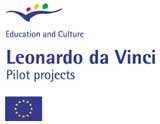
Project Information
The requirements for MARVEL are based on demands of vocational colleges and their links to industry. Increasing pressure is placed on vocational training to expose students to real working environments and to support the training of multiskilled technicians.  This development led to a new type of job profile - a mix of electrical, mechanical and IT knowledge called Mechatronics. It is obvious, that the dissemination of mechatronic systems simultaneously requires adequate service techniques. Mechatronic components can easily be integrated into telematic environments and into corresponding workconcepts for tele-service such as remote diagnosis and maintenance of mechatronic systems. The emergence of remote service techniques has benefits for mechatronic engineering and plant construction industries as well as for their customers: Service problems can be diagnosed off site and local workers can be supported by a central team of remote experts. At the same time, communication between the manufacturer and the user of machinery is improved. This helps to reduce service costs while increasing the availability of systems. This development led to a new type of job profile - a mix of electrical, mechanical and IT knowledge called Mechatronics. It is obvious, that the dissemination of mechatronic systems simultaneously requires adequate service techniques. Mechatronic components can easily be integrated into telematic environments and into corresponding workconcepts for tele-service such as remote diagnosis and maintenance of mechatronic systems. The emergence of remote service techniques has benefits for mechatronic engineering and plant construction industries as well as for their customers: Service problems can be diagnosed off site and local workers can be supported by a central team of remote experts. At the same time, communication between the manufacturer and the user of machinery is improved. This helps to reduce service costs while increasing the availability of systems.
The increasing dissemination of mechatronic systems in combination with tele-service implies new de-mands to the skilled worker in this field. Work in mechatronics requires cognitive and operational knowledge about building systems, diagnosis and maintenance. However, a significant change is that work processes nowadays are essentially characterised by the use of telemedial systems. Service staff in the professional field need the ability to achieve their aims in (tele) cooperation with others, and they should be able to cooperate in virtual and supranational forms of organisation. On the other hand, there exist no elaborated concepts concerning pedagogical, technical and organisational aspects, particularly in the emerging field of mechatronics. Cultural differences and similarities concerning learning and collaboration styles can be noticed but haven't been integrated into curricula, courseware and teaching methods. Thus the MARVEL project is intended to stimulate learning concepts, that serve an actual need in the mechatronics industry.

Main target groups of the MARVEL project are students in vocational education and training in Mechatronics. Main teaching subjects are system control, maintenance, process monitoring, automation technology of networked mechatronic plant and machinery on the basis of remote techniques (tele-services). The MARVEL concept is intended also to have impacts on life long learning and extended vocational training of full time workers (mobility and flexibility through the combination of local and tele-courses). In the same way as our concept supports students mobility, it also helps vocational training institutions to offer mechatronic courses in cooperation with industry partners, using remote techniques.
|


 This development led to a new type of job profile - a mix of electrical, mechanical and IT knowledge called Mechatronics. It is obvious, that the dissemination of mechatronic systems simultaneously requires adequate service techniques. Mechatronic components can easily be integrated into telematic environments and into corresponding workconcepts for tele-service such as remote diagnosis and maintenance of mechatronic systems. The emergence of remote service techniques has benefits for mechatronic engineering and plant construction industries as well as for their customers: Service problems can be diagnosed off site and local workers can be supported by a central team of remote experts. At the same time, communication between the manufacturer and the user of machinery is improved. This helps to reduce service costs while increasing the availability of systems.
This development led to a new type of job profile - a mix of electrical, mechanical and IT knowledge called Mechatronics. It is obvious, that the dissemination of mechatronic systems simultaneously requires adequate service techniques. Mechatronic components can easily be integrated into telematic environments and into corresponding workconcepts for tele-service such as remote diagnosis and maintenance of mechatronic systems. The emergence of remote service techniques has benefits for mechatronic engineering and plant construction industries as well as for their customers: Service problems can be diagnosed off site and local workers can be supported by a central team of remote experts. At the same time, communication between the manufacturer and the user of machinery is improved. This helps to reduce service costs while increasing the availability of systems.
